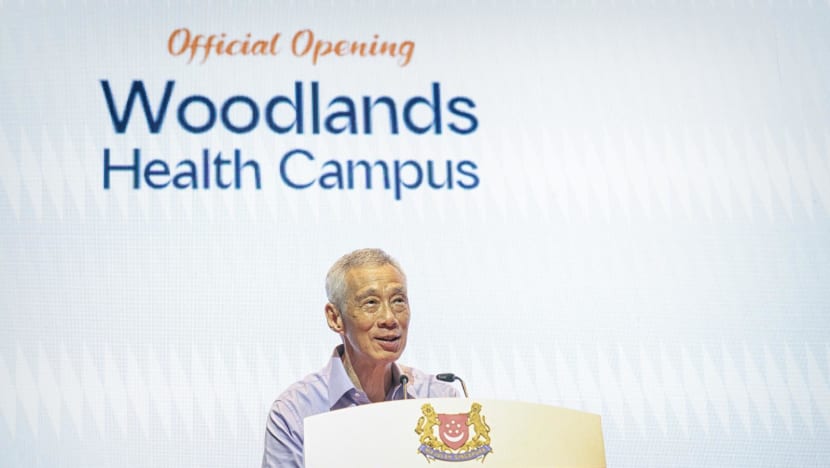Woodlands Health opening offers nearby residents 'more convenient access' to hospital services: SM Lee
The Woodlands Health Campus integrates an acute hospital, community hospital and a nursing home.

Senior Minister Lee Hsien Loong delivering his speech at the official opening of Woodlands Health Campus on Jul 13, 2024. (Photo: Woodlands Health)

This audio is generated by an AI tool.
SINGAPORE: Residents in Sembawang, Choa Chu Kang and those living in nearby areas can have easier access to acute hospital services with the opening of Woodlands Health Campus.
Speaking at its official opening on Saturday (Jul 13), Senior Minister Lee Hsien Loong noted that it is set to boost bed capacity in the northern region of Singapore, "providing 1,000 more acute and community hospital beds when fully opened".
The third general hospital in the past decade to open, after Ng Teng Fong General Hospital (NTFGH) and Sengkang General Hospital (SKH), Woodlands Health received its first patients in December last year, while its emergency and acute medical services began operating in May.
According to its website, the hospital, located at 17 Woodlands Drive 17, currently operates 460 acute and community hospital beds.
"Residents of Woodlands, Sembawang, Choa Chu Kang and nearby areas will now have more convenient access to acute hospital services," Mr Lee said.
"They will no longer have to travel all the way to Khoo Teck Puat Hospital (KTPH) or Ng Teng Fong General Hospital, they can come here."
Woodlands Health helped triage and decant 350 patients from KTPH's emergency department from May 2 to Jun 15, the National Health Group (NHG) said on Monday in response to CNA's queries.
Patients at the emergency department were assessed by both KTPH and Woodlands Health's medical teams, and those who required admission were taken to Woodland Health, NHG added.
"This has enabled more timely and accessible care for our patients, improving the overall management of specialist appointments and bed capacity," said Professor Joe Sim, group chief executive officer at NHG.
Patients with scheduled specialist appointments are now also being attended to earlier, said Prof Sim, noting that some of them who initially had to wait two months for an appointment were able to get it at Woodlands Health within two weeks.
Nearly 1,100 KTPH patients and about 250 TTSH patients have transferred their specialist appointments to Woodlands Health since its medical centre opened in December 2023, said NHG.
"This helps to provide Woodlands residents with faster access to care as they will receive earlier appointments and at the same time, relieve some patient load from KTPH and TTSH," it added.

The Woodlands Health Campus integrates an acute hospital, community hospital and a nursing home, with Mr Lee noting how it "consolidates a comprehensive suite of services in a single location".
"The campus will not only offer the usual services (management of acute emergencies, rehabilitation, and recovery), but it will also provide long-term care services – including day care, home care, nursing care and palliative care," he said.
"This makes it much easier to right-site patients and also a lot more convenient for patients to transition seamlessly from treatment to convalescence, and to receive the appropriate care in one place."
It has also been set up to treat increasingly prevalent conditions among young people, including obesity, hypertension and chronic kidney disease, he added.
Some facilities at Woodlands Health make use of technology in a bid to bolster operational efficiency, as well as to offer an improved patient care and caregiver experience.
These include an automated pharmacy that shortens the time patients have to wait when collecting their medicine and the use of patient bedside terminals.
Mr Lee noted how nurses traditionally relay information to patients in person, briefing them on matters like their medical condition and test results.
"As a result, patients have limited opportunities to engage actively in their own care plan and to stay updated on their recovery progress," he said.
"With the (patient bedside) terminals, patients can access the care plan for their stay themselves, their vital signs charts, and educational resources relevant to their condition ... and participate more actively in their recovery journey."
Mr Lee touched on how patients can not only order their preferred meals but also watch YouTube videos via the terminals, and that the hospital had begun to deliver healthcare in the community through its WH@Home programme.
First launched in April 2022, it offers patients the option to be cared for in their own homes instead of a hospital ward.
The Senior Minister also joked how people often have a "perception that hospital food is bland and tasteless".
But after sampling a few dishes from the in-patient menu like mutton vindaloo, and that other "interesting choices" like Thai green curry and Irish beef stew had caught his eye, he quipped this is "certainly not your typical hospital fare".
"DON'T UNDERESTIMATE DIFFICULTY OF KEEPING HEALTHCARE SYSTEM WORKING WELL"
While Mr Lee said that Singapore's healthcare system is "in good shape", with access to high quality and affordable healthcare as well as "reasonable" wait times, he cautioned that there are "too many examples elsewhere of healthcare services practically at breaking point".
"Please do not underestimate the difficulty of keeping the healthcare system working well," he added.
He noted the Ministry of Health's (MOH) plans to expand existing hospitals, redevelop Alexandra Hospital, open a new Eastern General Hospital Campus, another new public hospital in Tengah and possibly a new non-profit private hospital.
"But our response cannot just be to keep on expanding our hospitals and adding acute bed capacity," he said.
"The problem with this approach is not just the heavy fiscal cost, or the difficulty of finding suitable plots of land to build more hospitals. Just as critically, we will run short of medical and nursing manpower to staff the additional hospitals."
To keep Singapore's overall healthcare costs sustainable over the long-term, Mr Lee urged "discipline" by not overtreating or overprescribing, and to be "discriminating in adopting new medical treatments, procedures, drugs and technology".
"At the same time, we must maintain the right mix of government subsidies, medical insurance, and individual co-payment, to minimise wrong, perverse incentives which would lead to unsatisfactory outcomes," he added.


















